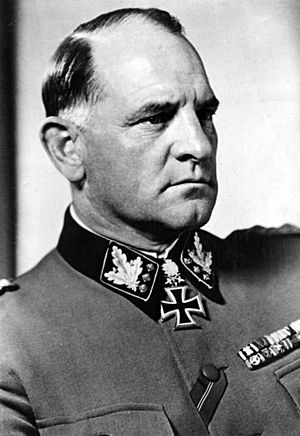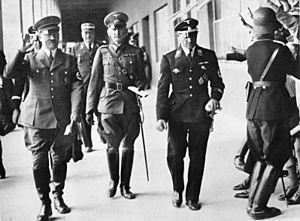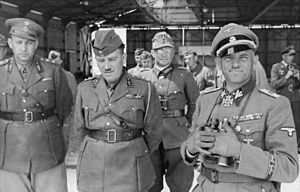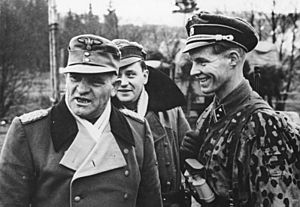Sepp Dietrich facts for kids
Quick facts for kids
Josef "Sepp" Dietrich
|
|
|---|---|

Dietrich in 1944
|
|
| Birth name | Josef Dietrich |
| Born | 28 May 1892 Hawangen, Bavaria, German Empire |
| Died | 21 April 1966 (aged 73) Ludwigsburg, West Germany |
| Allegiance |
|
| Service/ |
|
| Years of service | 1911–18 1928–45 |
| Rank |
|
| Service number | NSDAP #89,015 SS #1,117 |
| Commands held | Leibstandarte SS Adolf Hitler I SS Panzer Corps 5th Panzer Army 6th Panzer Army |
| Battles/wars | World War I
|
| Awards | Iron Cross First Class (1914) Tank Memorial Badge Knight's Cross of the Iron Cross with Diamonds |
| Signature | |
Josef "Sepp" Dietrich (born May 28, 1892 – died April 21, 1966) was a German military leader during the Nazi era. He joined the Nazi Party in 1928 and became a member of the Reichstag (German parliament) in 1930. Before 1929, Dietrich worked as Adolf Hitler's driver and personal bodyguard.
Even though he didn't have formal training as a staff officer, Dietrich became one of the highest-ranking officers in the Waffen-SS. This was the military part of the SS. He reached the rank of Oberst-Gruppenführer and led large military groups during World War II. After the war, Dietrich passed away in 1966.
Early Life and Military Service
Josef "Sepp" Dietrich was born on May 28, 1892, in Hawangen, a town near Memmingen in the Kingdom of Bavaria, which was part of the German Empire at the time.
In 1911, he joined the Bavarian Army. He served with the 4th Bavarian Field Artillery Regiment. During the First World War, he fought with the Bavarian field artillery. He was promoted to Gefreiter (a type of corporal) in 1917. He also received the Iron Cross 2nd class for his service. In 1918, he was promoted again to Unteroffizier (Corporal). His military records show he also received the Iron Cross 1st class.
Joining the Nazi Party
Life in the Weimar Republic
After the First World War ended, Dietrich worked in various jobs. These included being a policeman and a customs officer. In 1928, he joined the Nazi Party (NSDAP). He then got a job at Eher Verlag, which was the Nazi Party's publishing company. He also became the commander of Hitler's personal bodyguard unit, known as the Schutzstaffel (SS). Dietrich's Nazi Party membership number was 89,015, and his SS number was 1,117.
Dietrich was introduced to Nazism by Christian Weber, who had been his boss at a gas station in Munich. He often traveled with Hitler around Germany. Later, Hitler helped him get other jobs, including different roles within the SS. He even allowed Dietrich to live in the Reich Chancellery, the main government building. On January 5, 1930, Dietrich was elected to the Reichstag (German parliament). He represented the region of Lower Bavaria.
By 1931, he had become SS-Gruppenführer, a high rank in the SS. When the Nazi Party came to power in 1933, Dietrich quickly moved up in the ranks. He became the commander of the Leibstandarte SS Adolf Hitler (LSSAH). This was Hitler's personal guard unit. He also became a member of the Prussian state council. Because he was close to Hitler, Dietrich could often ignore orders from his SS superior, Heinrich Himmler. At one point, he even prevented Himmler from entering the Leibstandarte barracks. The LSSAH eventually grew into an important military division within the Waffen-SS. Even though the unit was officially under Himmler, Dietrich was the true commander. He managed its daily operations.
In the summer of 1934, Dietrich played a role in a political event known as the Night of the Long Knives. This event helped Hitler strengthen his power.
World War II Campaigns
After World War II began in Europe, Dietrich led the Leibstandarte unit. They advanced into Poland and later into the Netherlands. After the Dutch surrendered, the Leibstandarte moved to France on May 24, 1940. They took a position near Dunkirk. The British forces were trapped there.
During this time, Dietrich received an award called the Knight's Cross of the Iron Cross. Dietrich continued to command the Leibstandarte during military campaigns in Greece and Yugoslavia. Later, he was promoted to lead the 1st SS Panzer Corps. This unit was part of Army Group Center on the Eastern Front. In 1943, he was sent to Italy on a special mission. He received many German military medals for his service.
Dietrich commanded the 1st SS Panzer Corps during the Battle of Normandy. He later took command of the 5th Panzer Army during the final stages of this campaign. Hitler then gave him command of the newly formed 6th Panzer Army. Dietrich led this army in the Battle of the Bulge (December 1944-January 1945). Hitler chose him for this task because he did not trust other military officers at the time.
In March 1945, Dietrich's 6th Panzer Army led an attack in Hungary. This attack, called Operation Spring Awakening, aimed to secure Germany's last oil reserves near Lake Balaton. Although they made some early progress, the attack was too ambitious and failed. After this failure, the 6th SS Panzer Army retreated to the Vienna area. As a sign of disapproval, Hitler ordered the Waffen-SS units involved in the battle to remove their special cuff titles that bore his name. However, Dietrich did not pass this order on to his troops. Soon after, Dietrich's troops were forced to retreat from Vienna by Soviet forces. On May 9, 1945, Dietrich, along with his wife, surrendered to the U.S. 36th Infantry Division in Austria.
Leadership and Skills
Dietrich had Hitler's full trust because he was very loyal. He was one of Hitler's favorite military leaders. Because of this, he received a lot of public attention, many awards, and quick promotions. Dietrich often took risks in battle, which military leaders sometimes disliked. For example, he once sent his Leibstandarte division to attack Rostov without orders, simply to gain a victory.
When Dietrich was promoted to lead a Corps, he was helped by skilled staff officers from the regular army. However, the army command still had to work to keep him in line. By 1944, it was clear that his military skills might not have matched his high rank. It was said that he had never learned how to read a military map. Field Marshal Gerd von Rundstedt thought he was "decent but not very smart." He was especially critical of how Dietrich handled the 6th Panzer Army in the Ardennes. Even Dietrich's main staff officer admitted that he was "no strategic genius."
Dietrich's long personal connection with Hitler allowed him to speak more openly than other senior officers. A fellow general reported that Dietrich would sometimes complain about Hitler and his close advisors. He would promise to tell Hitler that he was "leading us all to destruction."
Awards and Recognition
- Golden party badge of the NSDAP
- Honour Chevron of the Old Guard
- Tank Memorial Badge
- SS Honour Ring (Deathshead ring)
- Blood Order
- Anschluss Medal
- Iron Cross 2nd Class 1914, Clasp for 1939
- Iron Cross 1st Class 1914, Clasp for 1939
- Knights Cross of the Iron Cross, with Oakleaves, Swords and Diamonds.
- Pilot’s Badge (Honorary)
Later Life
After his release from prison, Josef Dietrich became involved in the activities of HIAG. This was an organization for former Waffen-SS members. It worked to improve the public image and legal standing of the Waffen-SS. Dietrich passed away in 1966 from a heart attack. Six thousand people, including many former SS members, attended his funeral.
Dietrich was married twice. He divorced his first wife in 1937 and remarried in 1942. He had three children.
See also
 In Spanish: Josef Dietrich para niños
In Spanish: Josef Dietrich para niños
- Register of SS leaders in general's rank
 | Janet Taylor Pickett |
 | Synthia Saint James |
 | Howardena Pindell |
 | Faith Ringgold |




